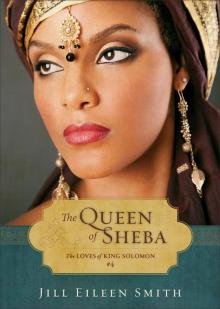- Home
- Jill Eileen Smith
Daughter of the Nile
Daughter of the Nile Read online
© 2016 by Jill Eileen Smith
Published by Revell
a division of Baker Publishing Group
P.O. Box 6287, Grand Rapids, MI 49516-6287
www.revellbooks.com
All rights reserved. No part of this publication may be reproduced, stored in a retrieval system, or transmitted in any form or by any means—for example, electronic, photocopy, recording—without the prior written permission of the publisher. The only exception is brief quotations in printed reviews.
ISBN 978-1-4934-0407-0
Scripture quotations are from The Holy Bible, English Standard Version® (ESV®), copyright © 2001 by Crossway, a publishing ministry of Good News Publishers. Used by permission. All rights reserved. ESV Text Edition: 2011
This is a work of historical reconstruction; the appearances of certain historical figures are therefore inevitable. All other characters, however, are products of the author’s imagination, and any resemblance to actual persons, living or dead, is coincidental.
Published in association with the Books & Such Literary Agency, Wendy Lawton, Central Valley Office, P.O. Box 1227, Hilmar, CA 95324, [email protected]
If a dedication could be made to a pet, Tiger would receive this one. While he will never read Siti’s story, his playful antics taught me much about the characters. I hope you will enjoy Abdukar as much as I enjoy my Tiger.
Contents
Cover
Title Page
Copyright Page
Dedication
Epigraph
Prelude
1
2
3
4
Interlude
5
6
7
8
9
10
Grace Note
11
12
Postlude
Note to the Reader
Acknowledgments
A Sneak Peek of The Crimson Cord
About the Author
Books by Jill Eileen Smith
Back Ads
Back Cover
Solomon made a marriage alliance with Pharaoh king of Egypt. He took Pharaoh’s daughter and brought her into the city of David until he had finished building his own house and the house of the LORD and the wall around Jerusalem. The people were sacrificing at the high places, however, because no house had yet been built for the name of the LORD.
1 Kings 3:1–2
Prelude
In all the lessons I learned in the harem of my father, Siamun, the Great Pharaoh of Egypt, one stood out above all others. Egyptian pharaohs might marry foreign princesses—women from Mitanni, Syria, Nubia, even as far away as Ethiopia. But never, ever would a Great Pharaoh give his daughter, especially a favored one such as I, to a foreign king.
It is said that some nations in their eagerness to please Egypt would request a fake princess, just to be able to say they had an Egyptian princess for a wife.
My father, the Great Pharaoh, always, always refused.
Until King Solomon of Israel came for a political visit.
I will never forget the look on my father’s face as he listened to that man speak of beasts and birds and reptiles and even fish! King Solomon knew more than any man my father had ever met. The realization left the Great Pharaoh, son of Ra, shaken.
In that moment, I think my father would have overlooked every promise he had ever made in order to give King Solomon anything he desired.
I just did not think that Solomon’s desire would include me.
1
EGYPT, 967 BC
I stood along the prow, watching the reeds pass us, my youngest kitten, Abdukar, held protectively in my arms.
“You should come and join us, Siti.” My mother, Thema, Great Wife of Pharaoh, sat beneath the papyrus awning of her ship while female slaves waved palm fronds before and behind her. The shouts of our people singing Bastet’s praises carried to us along the shore. But the air on the water was as still as the Nile beneath us, broken only by the dip of the slaves’ oars in the green water.
I glanced once more at the peasants and fishermen, workmen who appeared to adore us, though I knew most of them held no affection for the royal family. My heart ached for their plight—so many were terribly poor and taxed above their means—and yet there was little I could do for them.
I turned away, feeling as I always did when I watched the crowds, and took the steps to the platform to sit on the raised dais beside my sister, Oldest Daughter of the Great Wife. Salama looked at me, one perfectly painted brow lifted in a question she did not need to ask. I nodded and offered her a hint of a smile. She knew what I thought of the way we treated the poor. The discussion was not worth bringing up again now.
“They love this festival to Bastet,” my mother said, drawing my pensive mood to her instead. She tapped one lengthy nail along the arm of her golden dais. “It gives them something to cheer them.” She looked down her long nose at me, as if daring me to disagree. It was not an argument I was in the mood to tackle.
“I want to honor Lapis when we arrive,” I said, changing the subject. “Her statue must be placed on the platform I ordered nearest the image of Bastet.” I met my mother’s gaze, pleased when Abdukar settled serenely in my lap. I petted his soft, spotted fur, the perfect blend of beige and browns. He was my favorite offspring of Lapis, whose mummified body rode entombed on a barge of its own, making its way slowly down the Nile ahead of us to Bubastis, where Bastet’s grand festival would commence the moment we arrived.
“Of course, my dear,” Mother said, her attention turned affectionately toward the small kitten in my lap. “It is a shame that Lapis could not live to care for him longer.” My favorite cat, Lapis, had died shortly after giving birth to a litter of five kittens, two of whom soon perished with her. I had rescued Abdukar and found another cat to nurse him. Cats abounded in my father’s harem, so finding a replacement mother had not been difficult. And cats are surprisingly accommodating creatures when it comes to caring for mothers and kittens. It is why Bastet was my goddess of preference among Egypt’s plethora of choices.
I touched the amulet of mother cat and kittens that fell softly between my breasts and rested against the fine linen of my garment, while continuing to absently pet the kitten. His purr felt like the thrum of distant drums beneath my hand.
“I suppose we should begin planning your wedding after the chaos of this festival dies down,” Mother said, turning to Salama. “We will set the date for a year from now—that should be enough time to get everything in order.”
Salama crossed one thin, brown leg over the other, her sheer skirt no longer hiding the gleaming skin beneath. She swung her leg up and down, as she always did when my mother’s attention focused too closely upon her.
“There is plenty of time to discuss it,” she said. “Shouldn’t we wait until we have secured Bastet’s blessing?”
Mother waved her hand as though thwarting the efforts of a pesky fly. “Nonsense. Your father has insisted that the agreement with Hamadi be drawn up and signed by the end of the month. I pushed for sooner, but . . .” She looked away, and I knew she struggled to say the truth out loud in front of so many servants. “But your father felt a month was sufficient.”
My mother did not want another wife to challenge her place or try to force her daughter into the line that could marry our half brother, the Great Pharaoh’s oldest son.
“You needn’t worry, Mother. Hamadi has been obsessed with Salama since she grew to womanhood. He will not accept another, even if a rival wife stakes a claim she does not possess.” I stroked Abdukar’s ears, calmed by the way the kitten turned his head into my hand, as though he fit in the palm like
a skin.
Mother huffed and faced Salama again, ignoring my attempts to assure her. “Nevertheless, it is better to secure these things while we can. What if the gods come for me before my time? What would happen to Salama then?” No mention of what would happen to me, but then I was the second daughter, whose future did not matter nearly as much to anyone but my father. The thought brought little comfort, for the pharaoh only treated me with favor when he happened to glimpse my presence, which was not often. The truth was that I was left to my own devices, which suited me well.
“Mother has a point, Siti.” Salama enjoyed interrupting my musings. “She would not be the Great Wife if Hamadi’s mother still lived, and we would not hold such privilege.” Salama lifted a manicured hand and studied the tips of each finger as though all of the answers to life’s struggles could be found in the henna patterns there.
“And a privilege it is,” Mother said. Her voice took on that tone that I knew meant Salama could not put off wedding plans no matter how loud her protests. “Once the agreement is sealed, we will begin construction on a new banquet hall to hold the engagement party. The construction alone will take months . . .” She continued on, her voice a drone to my ears, while Salama made occasional comments or answered questions yes or no. This would be my mother’s doing, and I was glad to be free to ignore the conversation. Salama would have little say in the matter and I even less, so it really made no sense to me that my mother cared to discuss this with either of us at all.
I turned my attention to the merrymakers along the shore, glancing every now and then at the barge carrying Lapis’s body. Her sarcophagus rivaled that of any prince, though much smaller. How fitting that her burial came at the same time as the festival to Bastet. Lapis would be pleased, though I secretly wondered if she wouldn’t be more amused. She never did care for much attention and would never have sat so long in my lap as Abdukar did now.
The oars dipped like sacred music, and I let my body move with the sway of the ship as the crowds lining the shore increased. Abdukar turned over and covered his ears with one paw, an action that made me smile. I would have loved the chance to cover my own ears so easily and blot out the strident voices coming from the people and the rising argument between my mother and sister now filling the air beneath the awning.
Mother had no doubt pushed too far for some detail Salama would not abide. My sister could be compliant when she needed to be, but she also knew how to speak her own mind—something I had never quite mastered. I glanced at them, caught up in their animated discussion, glad it was not my wedding we were forced to plan so quickly.
But the securing of Hamadi’s future rule was of prime importance, now that he was nearly twenty and Salama seventeen. They could have married much sooner, at least in name, but Mother had not won the battle over their nuptials with the pharaoh until now.
A slow sigh escaped me, and I rose, kitten in hand, and walked to the bow where the breeze coming off the water could whisk away the troubled thoughts that had overtaken me. Grief and joy do not mix well, and yet, as Pharaoh’s daughter, I was expected to exhibit both with grace. Bastet would understand my struggles, but would I have the chance to speak with her when I laid Lapis to rest in her temple?
Abdukar stirred and used his tiny claws to latch onto the linen strap of my fitted dress. “It’s all right, little one. I would never toss you to the crocodiles.” I held him closer, needing the warmth of his tiny body as much as he needed the comfort of my hand on his back.
Cats were trustworthy creatures. They did not ask foolish questions or place impossible demands on me. Unlike my mother, whose very position kept her on edge and caused unwarranted overprotectiveness of her children—well, perhaps not unwarranted. There had been times in the not-so-distant past where royal children were killed by rivals. The closer one drew to Pharaoh’s ear, the more vulnerable that one became, thus my mother’s protectiveness. I often squirmed to be free of the confinement, to be allowed to wander alone wherever I pleased. To marry whom I pleased, if I married at all.
But that was not a choice I would be allowed to make. Not unless I could convince my father . . .
If my mother had her way, I would marry my cousin Nakhti soon after Salama wed Hamadi. I did not want to marry Nakhti, nor any other cousin or half brother—all of whom were spoiled children, no matter how handsome.
I kissed the top of Abdukar’s head. Pray Bastet I would have some say in this one decision that would shape my entire future. For as I listened to the continued bickering of my mother and sister, I knew my chances were less than good. Only my father could overrule my mother’s choice. And I had little chance of convincing him to do so.
2
Our ship docked at last in the port of Bubastis, where crowds danced and sang, women shook noisemakers, others moved in ways that I thought reckless. I walked past some of the more base elements of men and women, grateful for the guards who blocked them in their drunkenness from reaching us. This was a procession of mourning for me, and despite my compassion for the poor who used these festivals to forget their trials, I was secretly grateful to Bastet for allowing me to walk unhindered beneath a canopy of palm fronds held by guards in white schentis, all the way from the docks to the center of this bustling city.
Lapis’s sarcophagus led our procession, and I followed closest behind it. My mother had allowed it thus because Lapis had been my pet, though she had come as a gift to my mother from a favorite aunt. It was my chamber she had sought most often, my bed she slept upon. And it was under my direction that she had been embalmed and a marble statue carved in her image.
Abdukar squirmed, burying his head beneath my arm as we walked. The fishy scents of the river receded as we passed the markets and turned onto the gleaming limestone thoroughfare toward Bastet’s temple. Already musicians and dancers lined the steps leading to the great doors. Pride lifted my chest as I stared up at the monument built to resemble the great cat.
The men carrying Lapis’s entombed body stopped at the foot of the steps, got down on one knee, and bowed their heads. I did the same, and though my head remained bowed, I could hear the shuffling and rustle of linen schentis and gowns as the entire crowd followed our lead. A moment of respect and silence followed, until at last the sarcophagus bearers rose, mounted the twelve gleaming steps, and entered the temple.
Guards flanked the entrance, tall javelins meant to block intruders held in both hands. They did not try to stop me or those in my family who followed behind. My skin felt the immediate change in temperature inside the granite and limestone temple, and I drew in a breath of the cool air.
Salama appeared at my right hand, and we at last stood before the new golden stand where men lifted Lapis’s statue. Others hefted the sarcophagus onto a slab in the hall where all of the Great Pharaoh’s cats lay entombed.
Salama placed one hand on my arm. I met her gaze. My sister knew my deep devotion to this place, this goddess. Perhaps it gave me comfort to know that something beyond myself was watching over me. When I lay awake in the dark of night and felt one of our many cats asleep beside me, I always calmed. Bastet’s little warriors were there for me. They gave their lives to protect each one of us in Pharaoh’s house.
The priestess greeted us with solemn words and spoke a blessing over Lapis. I held Abdukar with one hand and knelt before the statue of the goddess, praying silently for wisdom. Should I listen to my mother and marry Nakhti? He is not a good man, oh great goddess. His temper frightens me—I sought the right words to convince her—and he is cruel at times. Is there not someone better? Surely my fate does not lie with the spoiled men of my family.
I continued beseeching her goodwill, though I could not imagine how such a prayer could be answered. A daughter of Pharaoh married the sons and nephews of Pharaoh, or by chance perhaps a high-ranking nobleman. I could think of no one in my circles that I desired—nay, even tolerated.
The thought depressed me, adding to my grief over Lapis. Outside, the crowd had
begun to talk in low tones, waiting for us to emerge from the temple so the festivities could begin. My mother and sister stood near the door, but they did not rush me as I lingered. It would take the work of a great god to give me the thing of which I asked of Bastet. And for the slightest moment I wondered if she was capable of granting such a thing.
I stood slowly, my cheeks flaming at the disrespect, the doubt I had entertained. Surely my many prayers would be heard. I walked to the entrance and dropped the required coins into the treasury. The priestess would offer more prayers on my behalf for the next six months, given the amount I had placed in Bastet’s coffers.
I petted Abdukar’s sleek fur and glanced at my mother, then abruptly took my sister’s arm, lest my mother read the rebellion against her wishes in my expression. I could not marry Nakhti. I shuddered at the very thought of him even as I walked arm in arm with Salama into the gathering dusk of Bubastis’s streets. Music and dance and the scent of beer floated around us as the crowds grew raucous. And then my cousin appeared not far from where we stood. Had my memory conjured him up?
“I don’t wish to see him,” I whispered into Salama’s ear. “He is arrogant, and I do not like the way he acts when he is filled with too much wine.”
“You may not be able to avoid him,” Salama said, one elongated finger pointing in his direction. “He has seen us.”
It was true. Nakhti, draped in a rich linen robe open at the shoulder and clasped with a golden pin in the shape of a locust, strode lazily toward us.
I grabbed Salama’s arm with one hand while still holding Abdukar with the other. “Run with me. We will escape him.”
Salama covered my hand and slowly lifted my tight grasp, laughing outright. “The streets are too crowded to run anywhere, my sister. Face the man and be done with it. He cannot get far with his temper here.”
I curled my lip but removed my hold on her. Nakhti was nearly within arm’s length, and as he extended a hand to each of us, we bowed simultaneously.

 Star of Persia: Esther's Story
Star of Persia: Esther's Story The Shepherdess
The Shepherdess Abigail (The Wives of King David Book #2): A Novel
Abigail (The Wives of King David Book #2): A Novel The Queen of Sheba
The Queen of Sheba Michal
Michal Rebekah
Rebekah A Passionate Hope--Hannah's Story
A Passionate Hope--Hannah's Story Daughter of the Nile
Daughter of the Nile Rachel
Rachel Sarai
Sarai Redeeming Grace: Ruth's Story
Redeeming Grace: Ruth's Story The Desert Princess
The Desert Princess The Prophetess - Deborah's Story
The Prophetess - Deborah's Story